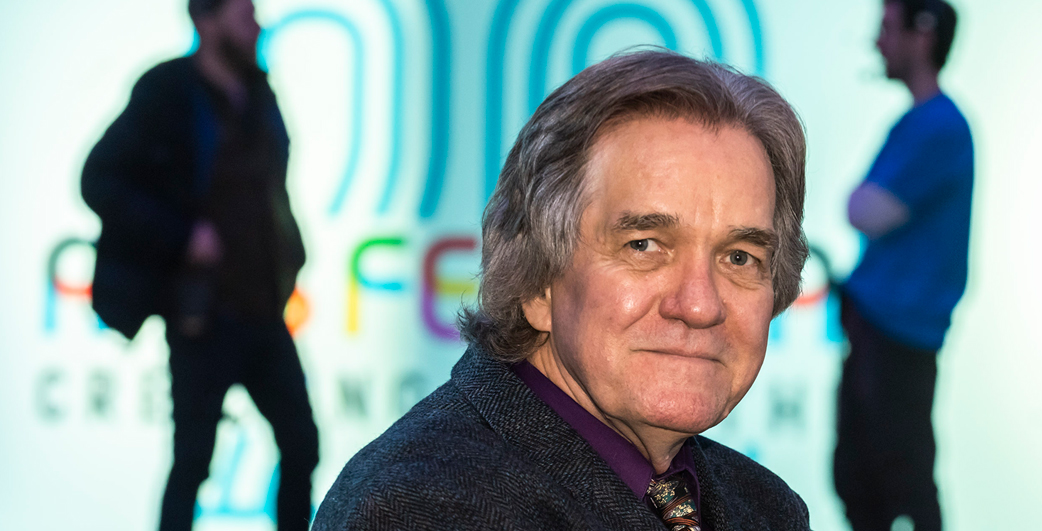Photo by Lee Pellegrini
It is a fitting metaphor to say that Professor of Art History Jeffery Howe has painted his Boston College career with broad brushstrokes. An engaged, popular and accomplished member of the faculty since 1978, he also has been committed to collaboration with colleagues, and service to the University and its members; a curator of several acclaimed McMullen Museum of Art exhibitions, he has been influential in the evolution of the arts at Boston College over the past four decades.
Howe has taught a wide range of courses in the history of art and architecture, served as chair of the Fine Arts Department (now the Art, Art History, and Film Department) and from 1998-2010, was the inaugural chair of the University Arts Council. Among its pursuits, the council launched and continues to organize the annual Arts Festival, which last month reached its 20-year milestone. An art history award for undergraduates is presented at the festival in Howe's honor.
He recently spoke with the Boston College Chronicle about his retirement this year.
What has been most gratifying during your career at BC?
Over 40 years at Boston College I have seen tremendous growth in the arts, and have been privileged to participate in their advancement. When I began teaching at BC, the arts were dispersed in remote silos, unconnected to each other and the larger life of the University. The first major transformation came in 1993 when the Fine Arts Department moved from the Newton Campus to Devlin Hall. I was department chair at the time, and it was a new beginning for all of us.
I have always been grateful for the freedom to shape my research and teaching according to my interests, and the chance to share the research with major exhibitions at the McMullen Museum. BC provides opportunities that are rare at other schools, and the administration gives faculty wings to make and share their discoveries.
Finally, I have been fortunate to work with talented and dedicated professionals in the arts in all of the endeavors of the Arts Council. I was never trained to be an arts administrator, and could never have survived without the skills of talented faculty and University staff. The support of University administrators, particularly the MCA&S deans, University provosts and Father Leahy, was crucial.
What will you miss most about teaching?
The enthusiasm and talent of the students, and vicariously sharing in their excitement at new discoveries and understandings of the creative process and history.
Have you learned any lessons from them over the years?
That art matters deeply to everyone. Some of the most passionate and insightful students I have worked with have come from across the University, including the Carroll School of Management, the sciences and the Lynch School of Education. Many students from the traditional humanities have enriched my classes with their individual backgrounds.
Also, that art unites cultures; the increase in international students has brought some of the finest and most original insights to my classes.
You've played a key role during your tenure in the evolution of the arts at BC.
The enduring success of the Arts Council is extremely gratifying, notably bringing about the first dedicated dance studio at BC on the Brighton Campus. After uncertain beginnings, the Arts Festival has thrived for 20 years.
Curating exhibitions at the McMullen Museum has been one of the most satisfying professional experiences. Being able to research such artists as Edvard Munch, Fernand Khnopff, Gustave Courbet, John La Farge, and a host of Belgian modernists and landscape artists would be exciting enough for most art historians. To be able to bring the actual works to Boston College and share them with the community is a dream come true. The beautiful new facility for the McMullen Museum is a fitting setting for the world-class art that will continue to be showcased there.
What's next for you? Will we continue to see you on campus at arts and other events?
Yes, Boston College will continue to be an important part of my life. I have committed to curating one more exhibition at the McMullen Museum for the fall of 2019. It will be titled Nature's Hieroglyphs: Landscapes of William Trost Richards, and will focus on the seascapes and geological paintings of the noted New England artist.
I will also continue to research the art of the late 19th century in Belgium, and may curate some additional exhibitions with Charles Hack, the extraordinary collector we featured in the 2017 exhibit Nature's Mirror: Reality and Symbol in Belgian Landscape.
—Rosanne Pellegrini | Universiry Communications




